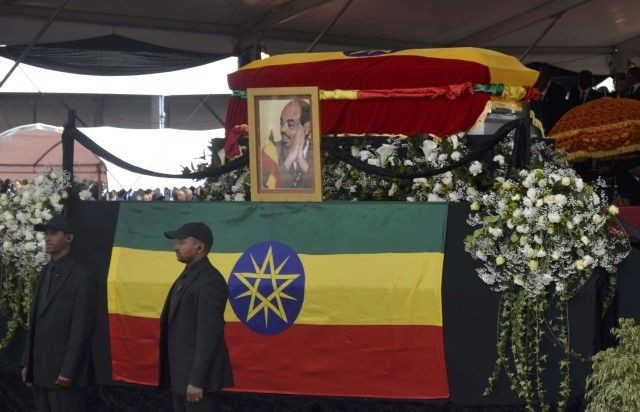Mourning Ethiopians Attend Funeral Of Influential Leader Meles Zenawi

Tens of thousands of Ethiopians gathered near a public square in Addis Ababa Sunday to attend the state funeral of Meles Zenawi, the influential prime minister of Ethiopia, who died last month.
Ethiopia's long-time leader died on Aug. 20 at the age of 57 of an undisclosed illness in a Brussels hospital after weeks of speculation about his health. Meles, who became Ethiopia's president in 1991 and prime minister in 1995, was regarded a major regional security partner of the U.S. Ethiopia has been a U.S. security base for military patrol over neighboring Somalia.
Meles was admitted to a hospital abroad in July. His health became a focus of speculation after he failed to attend an African Union summit in the capital, Addis Adaba, in mid-July.
Ethiopian officials said dignitaries from around the world including several African leaders, and a White House delegation led by Susan Rice, the U.S. ambassador to the U.N, were attending the funeral, the Associated Press reported. The funeral, Ethiopia's first in more than 80 years, followed two weeks of national mourning. The coffin will later be taken for burial at the city's Holy Trinity Cathedral.
Meles is survived by his wife Azeb Mesfin, an MP, with whom he had three children.
Days after Meles died, the government confirmed that deputy Prime Minister Hailemariam Desalegn will take over power until national elections in 2015.
Meles and members of the Transitional Government of Ethiopia, or TGE, established in July 1991, pledged to oversee the formation of a multiparty democracy. The election for a 547-member constituent assembly was held in June 1994. The assembly adopted the constitution of the Federal Democratic Republic of Ethiopia in December 1994.
Ethiopia's first democratic elections for the national parliament and regional legislatures were held in 1995. Most opposition parties chose to boycott these elections, ensuring a landslide victory for the Ethiopian People's Revolutionary Democratic Front, or EPRDF, which formed a government headed by Meles.
The early years of governance under Meles are widely regarded to have promoted a policy of ethnic federalism, devolving significant powers to regional, ethnically based authorities in Ethiopia.
In 2010, however, observers declared that the Ethiopian parliamentary elections failed to comply with international standards, saying that the EPRDF used the advantage of incumbency to restrict political space for opposition candidates and activists.
Meles won another five-year term in office after reportedly receiving 99 percent of the vote.
He came under fire again in 2011 when the Ethiopian government arrested more than 100 activists, journalists and political leaders for alleged involvement in terrorist activities and charged many of them under Ethiopia's controversial anti-terrorism proclamation passed in 2009. Five journalists and two opposition members were convicted on terrorism-related charges while several others are currently on trial.
Despite his tainted human rights record, Meles was regarded by the Western observers as having played an irrefutable role in Ethiopia's progress.
A leaked 2009 U.S. diplomatic cable described Meles as "quiet, deliberative and certainly not a 'man about town,'" adding he was a "voracious reader and very introspective."
Meles oversaw the independence of Eritrea from Ethiopia in 1993 but later resorted to a border war in the period between 1998 and 2000 that led to tens of thousands of casualties.
Meles also invaded Somalia in 2006 but withdrew his forces due to increased guerrilla resistance only to attack the country again in 2011.
© Copyright IBTimes 2024. All rights reserved.





















